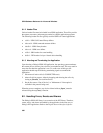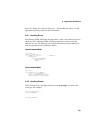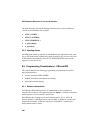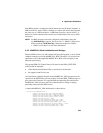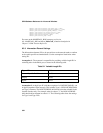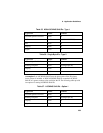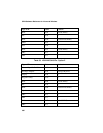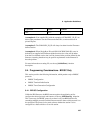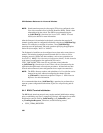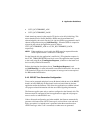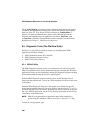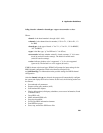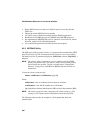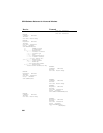ISDN Software Reference for Linux and Windows
358
NOTE:
North American protocols often require TE devices configured as the
User side to transmit a Service Profile Identifier (SPID), which is then
acknowledged by the switch. The SPID is programmed using the
cc_SetDChanCfg( ) function. See Section 8.4.2. BRI/SC Terminal
Initialization below for more information.
After the firmware is downloaded to the board, each station that requires D
channel signaling must be configured individually using the cc_SetDChanCfg( )
function. For example, to configure 16 stations, 16 cc_SetDChanCfg( )
operations must be performed, with each operation specifying the appropriate
station ID (for example, "briS1" to "briS16").
The D channel of each line can be configured at any time and as many times as
needed. This includes changing between Network and User sides as well as
changing protocols, SPIDs, and other attributes, such as tone generation (see
Section 8.4.3. BRI/SC Tone Generation Configuration below). If calls are active
at the time of reconfiguration, the application will receive
CCEV_DISCONNECTED events for any calls that existed when the
cc_SetDChanCfg( ) function was issued. Those calls are disconnected by the
application through normal call tear-down procedures. All data links are then
severed and reconnected (some configurations do not require reconnection).
NOTE:
The SPID, directory number, and subaddress of a User-side line can be
changed at any time without reconfiguring the channel. See the
cc_SetParmEx( ) function description in Chapter 5. ISDN Function
Reference for more information.
It is recommended that the cc_SetDChanCfg( ) operations be performed by a
separate system configuration task and not as part of a call processing task or
thread.
8.4.2. BRI/SC Terminal Initialization
The BRI North American protocols may require terminal initialization settings
prior to establishing any layer 3 connectivity. Dialogic API support for terminal
initialization consists of the cc_SetDChanCfg( ), cc_SetParmEx( ) and
cc_TermRegisterResponse( ) functions, and the following events:
• CCEV_TERM_REGISTER



